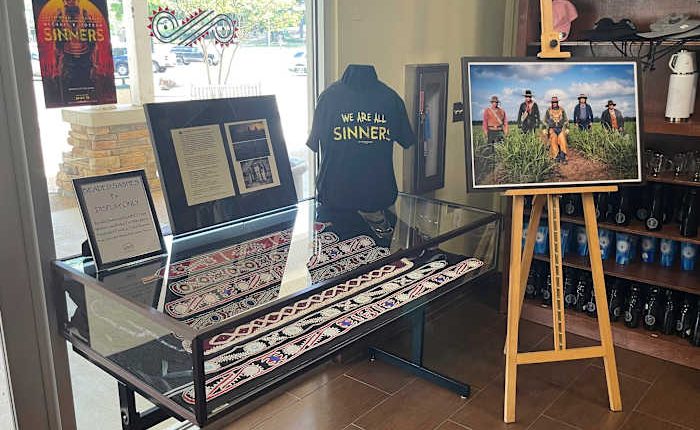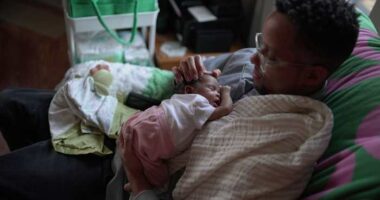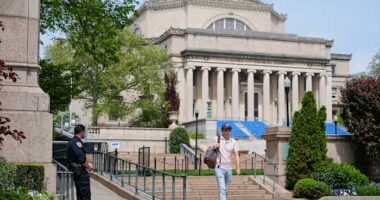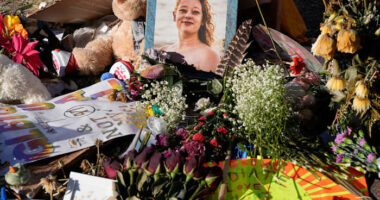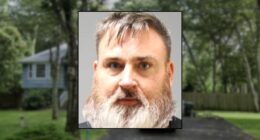Share this @internewscast.com

CHOCTAW, Miss. – It’s a small part in a big movie, but for the Mississippi Band of Choctaw Indians, their scene in “Sinners” is a huge deal.
The horror movie blockbuster, featuring Michael B. Jordan as a gangster turned vampire slayer, offers a brief but impactful depiction of the tribe, using Choctaw actors and cultural experts. For some, it marks the first time they’ve seen the Choctaw way of life accurately reflected on the big screen.
In the scene, a group of Choctaw, riding horseback and in an old truck, arrives at a small farmhouse to caution the couple living there about imminent danger. When the couple declines their assistance, a Choctaw man wishes them luck in his native language before departing.
“I’ve not seen another movie that has our language, like, spoken correctly,” said Cynthia Massey, a cultural consultant for “Sinners.”
Massey operates the tribe’s Chahta Immi Cultural Center with Sherrill Nickey and department director Jay Wesley. The trio was engaged as cultural consultants to ensure the tribe was authentically portrayed in the film. They meticulously examined archives, studying how their ancestors would have dressed, spoken, and behaved in the 1930s, the period in which “Sinners” is set.
“I was honored and humbled by the fact that they wanted a true representation,” said Wesley, who also acted in the movie.
Wesley connected the filmmakers to Choctaw actors and artifacts like the beaded sashes the Choctaw characters wear in the movie. Those sashes are now part of a “Sinners” display at the cultural center.
The movie’s introduction also features a short snippet of a Choctaw war chant, performed by Wesley’s daughter, Jaeden Wesley, who is a student at the University of California, Los Angeles. While recording, Jaeden Wesley said the filmmakers told her they wanted the Choctaw people to hear their music in the movie.
“We were catering to our own people, even in that short little second,” Jaeden Wesley said.
Shining a spotlight on often overlooked cultures and topics, like the Choctaw people, is part of the mission at Proximity Media, which produced “Sinners.” The company was founded by “Sinners” director Ryan Coogler, his wife and film producer, Zinzi Coogler, and producer Sev Ohanian.
“It was never a question for us that if we were going to portray the Mississippi Choctaw, we got to have the right people who can tell us, who can tell Ryan, what we’re not knowing, what we’re not thinking,” Ohanian said. “It was all because we’re trying to serve Ryan’s story of like putting truth on screen.”
Ohanian and his co-founders didn’t stop with Choctaw consultants; they enlisted a small army of experts who advised on the confluence of cultures mingling in the Mississippi Delta, where the film is set. The resulting cinematic world was so well received, community organizers penned an open letter, inviting Coogler and his fellow filmmakers to visit the Delta. Last week, the Cooglers, Ohanian and others took up the offer, attending a “Sinners” screening in Clarksdale, Mississippi. Clarksdale is where the film’s events unfold.
“I hope this encourages other filmmakers to find opportunities to be authentic in their storytelling and to look at this rich tapestry of culture that’s right here in America,” Ohanian said, noting the film industry has historically misrepresented nonwhite groups.
For Wesley and his fellow consultants, the hope is the film will cultivate curiosity in audiences, encourage them to learn more about Choctaw culture and visit the Chahta Immi Cultural Center.
“It’s important to be connected to this culture because this was here before the public was here,” Massey said. “Probably three-quarters of Mississippi was Choctaw land, and now we only have 350,000 acres.”
They say Choctaw participation in the film has cultivated a sense of pride among tribe members. Nickey hopes it will encourage a sort of cultural renaissance at a time when she says fewer and fewer Choctaw speak their native language.
“I know for a fact that there are a lot of kids out there that don’t even know how to speak our language. They only speak English,” Nickey said. “I hope they know it’s okay to speak our language.”
Copyright 2025 The Associated Press. All rights reserved. This material may not be published, broadcast, rewritten or redistributed without permission.
